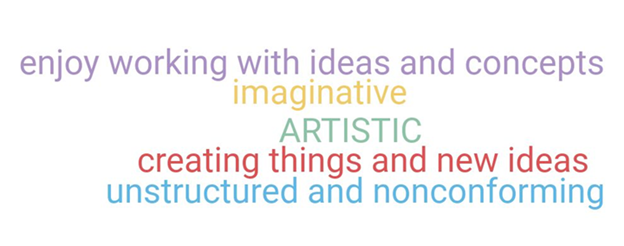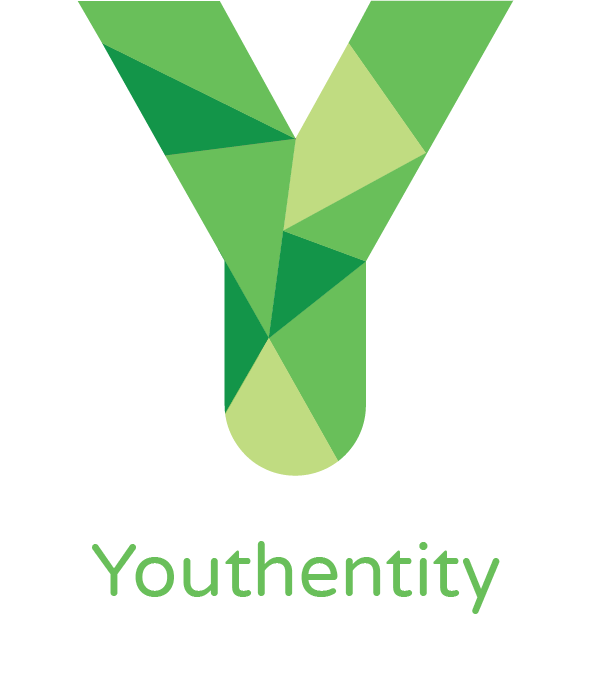CAREER DISCOVERY
About Work Personalities
Discovering your interests is a good way to kick off your career planning. This may be done in many ways such as summer jobs, volunteering, participating in extra-curricular activities, and through your education. But sometimes it is difficult to see how what you enjoy doing in high school will lead to a career. One tool to help you is an interest-based assessment called the Holland Code or RAISEC, an acronym for Realistic, Artistic, Investigative, Social, Enterprising, and Conventional. The Holland Codes were developed by psychologist John L. Holland and have guided people successfully for many years. The six codes are groups of jobs and careers that have similar “work personalities”. The idea is if a career field fits your personality well, you are more likely to enjoy it.
What is an Interest Profile?
Your interest profile is a combination of three career codes from the following: Realistic, Artistic, Investigative, Conventional, Enterprising, and Social. One career code is not better than another and your career code may change over time if your interests change so don’t limit yourself as you explore. In the meantime, your career codes will provide you with an excellent starting point for your journey!
Below are brief descriptions of each Holland Code. You might recognize yourself in some of these, even before taking the assessment.






ABOUT JOB ZONES
There are many things to consider when selecting your first career and many of them are personal to you such as whether the career interests you.
By now you have spent many years of your life in school. You probably have a deep understanding of how you like to learn and a general idea of how much additional time after high school you'd like to invest in your education and training for your first career.
This brings us to job zones. The U.S. Department of Labor has organized careers into job zones as follows:
Job Zones 1 & 2: the career may or does require a high school diploma or GED
Job Zone 3: one to two years of additional years of preparation is needed
Job Zone 4: two to four years of preparation are needed
Job Zone 5: more than 4 years of preparation are needed
In addition to how many years you are willing to invest, please think about how you want to learn. For some careers, you can work during the day for your employer (on-the-job training) and take classes at night during your apprenticeship. These classes are often paid or partially paid for by your employer. Would you prefer to learn in a traditional classroom or laboratory setting? Or are you willing to do either based on the career you'd like to have? Knowing how you'd like to prepare for your career can also help you with a career selection.
CAREER PREPARATION OPTIONS
Choosing the career preparation path that is right for you will likely depend on the career you want to pursue. Some areas are so specialized that they do not offer a lot of flexibility in terms of the job you will be qualified to apply for. For example, a dentist, dental assistant, and dental hygienist have different educational requirements even though they work as a team to care for you. Another example is an electrician and an electrical engineer. An electrical engineer must complete at least a 4-year degree in electrical engineering; an electrician is educated and trained through a combination of coursework and field experience as an apprentice. After meeting certain requirements, they become a journeyperson and may elect to become a master with additional experience and training. In Colorado, electricians must be licensed.
Here are ways you might prepare for your career depending on the career you're interested in. We have organized these by job zone.
Job Zones 1&2 (High School Degree or GED Typically Required)
-
Employers may elect to hire high school graduates and provide the training they need at work. Often employers are looking for good general employability skills and attitudes such as being on time, working well with others, and having a sincere interest in the work. The employer will teach you the technical skills you need to be successful on the job. These positions can also provide upward mobility within the organization.
-
You may elect to educate yourself on your own time such as taking online or in-person classes in order to obtain various industry-specific certificates. Examples of this might include coding, website design, software, and more. This way, you could work in an industry of your choice while you build your credentials in the same or another industry altogether.
Job Zone 4 (Two to Four Years of Preparation Typically Required)
-
In the context of a technical career, an apprenticeship involves a combination of on-the-job training under a master technician while you attend classes. For example, in our area, if you wanted to become an electrician, you could become employed by an electrical contractor and work as an apprentice during the day and attend classes at night. You will earn a wage during the day and often your employer will pay for your classes. Once you successfully complete both, you will become a Journeyperson. In the electrician's world, an apprenticeship lasts four years.
-
This degree is usually finished in two years. It could be a degree in a technical field that may lead to employment right away, such as a radiologic technician, or it could be a degree in a field that also offers a bachelor's degree. Many times, but not always, a student might receive an associate degree in a field at a community college and then transfer to a 4-year institution to get their bachelor's degree. I cannot say enough about the importance of developing your course plan starting with the institution you intend to graduate from with your bachelor's degree and then working backward to make sure you take the prerequisites needed at the community college. And, make sure your community college courses will be accepted as transfer credits at that institution toward the requirements for the bachelor's degree. Accumulating two years of credits does not mean you will automatically be on track to receive a bachelor's degree in four years. Some associate degrees that you may come across in your research are A.A. (Associate of Arts), A.S. (Associate of Science), and A.A.S. (Applied Associate of Science).
-
This is a 4-year degree available at colleges and universities. In addition to general education requirements intended to help you become a well-prepared person for the workplace, the degree will have specific course requirements in the field of study. Often you will see the abbreviations B.A. and B.S.
• A B.A. is a Bachelor of Arts that usually focuses on liberal arts, humanities, and social science.
• A B.S. is a Bachelor of Science that usually focuses on technical and science-related studies.
Job Zone 3 (One to Two Years of Preparation Typically Required)
-
Several technical careers require a certificate and/or licensing. Examples are cosmetologists, nail technicians, electricians, plumbers, heating, venting, and cooling, and some large equipment operators. Usually, this type of preparation is offered at technical schools, community colleges, and some universities. There are also fields where you may be able to choose a certificate path or a college degree path.
Job Zone 5 (Over Four Years of Preparation)
-
In some technical fields, a Journeyperson can invest additional hours of training and education into their career and move from a Journeyperson to a Master. This could take a total of six years. As a master, you may be able to open your own company.
-
A master's degree is a degree that follows the completion of a bachelor's degree. While a master's degree is more rigorous than a bachelor's degree, it usually takes two years to complete provided you already have taken all of the prerequisites required for this degree.
-
A doctoral degree usually follows the completion of a bachelor and master degree. This degree is the highest degree one may achieve and usually takes 3 to 5 years to complete. In an academic setting, if your instructor has a doctoral degree, you will likely see Ph.D. after their name. Ph.D. stands for Doctor of Philosophy. Anyone who has received a doctoral degree may be referred to as Doctor (Dr.).
-
This degree is a doctoral degree that is required to work in a specific career such as medical doctor, dentist, veterinarian, and lawyer. These degrees are abbreviated as MD, DDS or DDM, DVM, and JD respectively.
-
A specialist degree or a professional doctorate is for someone who has an interest in the practical application of knowledge in a field and wants a career in a practical setting such as a corporation or a school system. A couple of examples of this are the Doctor of Business Administration (DBA) and the Doctor of Education (EdD).
DISCOVER YOUR WORK PERSONALITY
Complete Your Interest Profiler and Discover Career Possibilities
There are many free online Holland Code or RIASEC assessments, but we have chosen one for you that we especially like. This tool will give you the opportunity to look at careers based on your work personality and your preferred job zones.
Tip! If you don't see a career you like in your preferred job zone, change your job zone to uncover more careers.
When you have received your career codes input them in your High 5 Your Life Career Plan below. You need to put in the numerical value.
